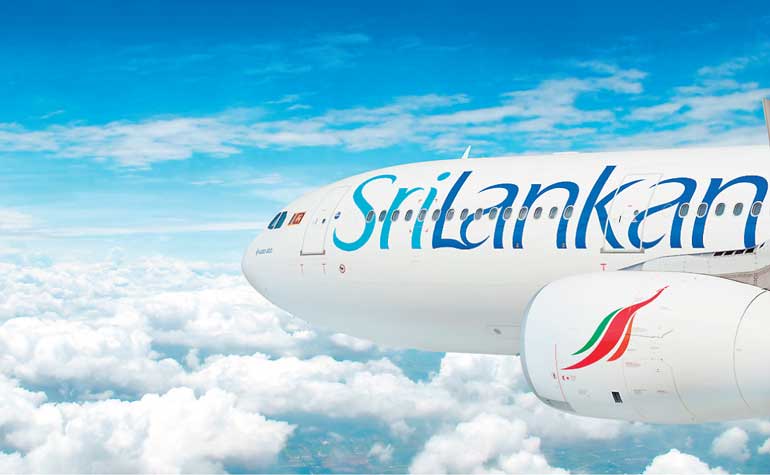Wednesday Feb 25, 2026
Wednesday Feb 25, 2026
Thursday, 10 August 2017 00:01 - - {{hitsCtrl.values.hits}}
 SriLankan Airlines has climbed to eighth position globally in IATA fuel efficiency ranking amongst 51 airlines in the same business model, following the implementation of a wide range of fuel efficiency and conservation measures over the last 22 months to reduce fuel burn.
SriLankan Airlines has climbed to eighth position globally in IATA fuel efficiency ranking amongst 51 airlines in the same business model, following the implementation of a wide range of fuel efficiency and conservation measures over the last 22 months to reduce fuel burn.
The 2016 ranking of airlines by the International Air Transport Association (IATA) has placed SriLankan eighth with an efficiency rating of 34.86Ltr/100RTK (litres per 100 revenue ton kilometres). The IATA benchmark for the year 2016 is 35.26Ltr/100RTK. This is a significant improvement over its performance in calendar year 2015 when it ranked 15th with a rating of 36.25Ltr/100RTK.
Due to the efforts and skills of its pilots, SriLankan Airlines achieved a saving of over $2.3 million, when comparing the planned fuel burn-off, against the actual in 22 months from August 2015 to June this year.
Fuel is the largest cost component for any airline, and with increasing fuel prices the actions of our pilots help in reducing our operational costs.
SriLankan’s fuel saving efforts are driven by a specialised Aviation Fuel Department in the Flight Operations Division, which constantly seeks new and innovative methods to reduce fuel usage whilst maintaining the highest safety standards and monitors the implementation of existing fuel conservation measures.
These include many IATA recommended initiatives, Airbus and industry best practice recommendations, at the planning stage and inflight. Flying on direct routes whenever possible, optimising flight levels to fly at the most fuel-efficient altitudes, maximum usage of engine reverse thrust when landing, taxi-in with single engine after landing and optimising the usage of auxiliary power unit are some of the techniques used during flights.
The Aviation Fuel Department provides a fuel report to every captain on a monthly basis, which gives them a better understanding of their fuel uplifts and savings, for possible improvement. All other stakeholders such as Inflight, Engineering, Cargo, Product Development, Flight Dispatch and Ground Services have contributed towards these achievements by improving their processes at the planning stage. In addition to savings from fuel efficiency measures, SriLankan also achieved a saving of $2.7 million during this same period using a process called “tankering” by Flight Dispatch, another section attached to Flight Operations.
Fuel tankering is a method by which airlines reduce their purchasing of fuel at airports where fuel prices are high and instead carry fuel from airports with lower fuel prices. Tankering is extensively used on flights to Maldives, where fuel prices are the highest in the network. This means the fuel load required for the return trip from the Maldives to Colombo will be carried out of Colombo.
Some South Indian destinations, Singapore, Malaysia and Thailand are some of the destinations where tankering is practiced, as fuel prices at these destinations are low, hence additional fuel is brought in to minimise fuel uplift for the next flight from Colombo, where fuel price is higher.
The extra fuel burn due to the increased weight as a result of extra fuel carried, engine wear are some of the factors that are carefully monitored and considered by Flight Dispatch when tankering.
Apart from achieving significant savings for the airline, the increase in fuel efficiency also directly enhances environmental conservation, an area in which SriLankan has long been a pioneer in the global air transport industry.
SriLankan currently operates to an online network of 41 destinations, and codeshares with other airlines to a total of 105 cities in 47 countries. As a member of the prestigious oneworld alliance, SriLankan also offers its passengers connectivity to over 1,000 cities in 160 countries that are served by its oneworld partner airlines.